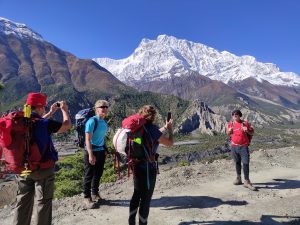AN OVERVIEW
Nepal Real Estate sector is dynamic, offering diverse opportunities driven by factors like tourism, urbanization, and infrastructure development. In cities like Kathmandu, the demand for modern apartments, commercial spaces, and accommodations fueled by tourism contributes to a vibrant market.
Government initiatives to streamline transactions and attract foreign investment enhance the sector’s appeal. Challenges, including documentation issues and infrastructure strains, exist but are met with ongoing efforts for improvement. With a rich cultural heritage and a growing economy, Nepal’s real estate landscape is evolving, presenting investors with a promising mix of traditional charm and modern development.
OPPORTUNITIES AND EXPECTATIONS IN NEPAL REAL ESTATE
For these reasons, Nepalese Real Estate is raising hopes and expectations to invest and work hard. As Nepal’s real estate landscape is evolving, presenting investors with a promising mix of traditional charm and modern development, it is showing ample opportunities and heightened expectations. Urbanization, tourism, and government initiatives create a demand for diverse properties.
The construction of modern residential complexes, commercial spaces, and hospitality facilities aligns with the growing economy. Anticipated infrastructure development projects further enhance the sector’s potential. Investors and developers can capitalize on these opportunities, expecting a dynamic market fueled by a mix of cultural charm and economic growth. Strategic adaptation to evolving trends, technological integration, and sustainable practices can contribute to a thriving and resilient Nepalese real estate landscape.
DIFFICULTIES FACING NEPALESE REAL ESTATE
Nepal’s real estate not only has promising charm and modern development, it has also business faces several challenges that have been impacting its growth and sustainability in the following ways:
- Documentation Issues: Complex and time-consuming documentation processes can hinder property transactions, leading to delays and inefficiencies.
- Infrastructure Limitations: Inadequate infrastructure, such as roads and utilities, can impact the value and accessibility of real estate developments.
- Zoning Regulations: Strict zoning regulations may limit the types of construction and land use, affecting the flexibility and creativity of real estate projects.
- Political Instability: Periods of political instability in Nepal can create uncertainty in the real estate market, impacting investor confidence and decision-making.
- Land Ownership Disputes: Disputes over land ownership and unclear land titles can result in legal complications and hinder property transactions.
- Lack of Financing Options: Limited access to financing options for both developers and buyers can constrain the growth of the real estate sector.
- Environmental Concerns: Nepal’s vulnerability to natural disasters raises concerns about the safety and sustainability of real estate developments, especially in earthquake-prone regions.
- Affordability Challenges: The affordability of housing for the general population remains a significant concern, affecting the accessibility of the real estate market.
- Corruption: Instances of corruption in the real estate sector can create challenges in fair and transparent property transactions, impacting the overall integrity of the market.
- Limited Technology Adoption: The slow adoption of modern technologies in real estate transactions and management may result in inefficiencies and slower market development.
WAYS TO SORT OUT PROBLEMS
Where there are difficulties and problems, there are also ways to address the challenges in Nepal’s real estate business that requires a comprehensive and collaborative approach involving various stakeholders. Here are some potential solutions which should be addressed by Nepal Government to make it easy to go ahead make all stakeholders optimistic in this field:
- Streamline Documentation Processes:
- Implement digital platforms and technologies for efficient and transparent property documentation.
- Simplify and standardize documentation requirements to reduce bureaucratic hurdles.
- Invest in Infrastructure:
- Prioritize and invest in infrastructure development, including roads, utilities, and public services, to enhance the value of real estate properties.
- Review and Update Zoning Regulations:
- Conduct a comprehensive review of zoning regulations to ensure they align with current urban development needs.
- Introduce flexible zoning policies that encourage innovative and sustainable real estate projects.
- Political Stability and Governance:
- Promote political stability to instill confidence in investors.
- Enhance governance structures and regulatory frameworks to ensure stability and transparency in the real estate sector.
- Land Ownership Transparency:
- Implement and enforce a transparent land titling system to mitigate land ownership disputes.
- Establish a centralized database for land records accessible to the public.
- Improve Access to Financing:
- Introduce policies to facilitate easier access to financing for real estate developers and buyers.
- Encourage collaboration between financial institutions and the real estate sector to create tailored financial products.
- Environmental Planning and Compliance:
- Enforce strict environmental standards and ensure that real estate projects comply with sustainability practices.
- Incorporate disaster-resilient designs in earthquake-prone regions.
- Affordable Housing Initiatives:
- Introduce incentives for developers to build affordable housing projects.
- Collaborate with public and private sectors to explore innovative financing models for affordable housing.
- Anti-corruption Measures:
- Strengthen anti-corruption measures within the real estate industry and regulatory bodies.
- Encourage transparency in property transactions and streamline approval processes.
- Technology Integration:
- Promote the adoption of technology for real estate transactions and management.
- Implement online platforms for property listings, transactions, and information dissemination.
These solutions require coordinated efforts from the government, real estate developers, financial institutions, and other stakeholders. Regular assessments and adjustments to policies can help create an environment conducive to sustainable growth in Nepal’s real estate business.
0 Review
Sort by:
Leave a Review




Join The Discussion